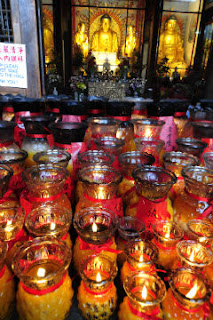“Hi. Is this your first visit to Canada?”
The lady at the airport inn in Richmond beamed with friendliness in the elevator.
 Ingrid and I looked at each other. We were both quite deeply tanned in spite of our daily slatherings of sunscreen. I managed to stammer out, “No. We live here,” feeling odd about having to say it.
Ingrid and I looked at each other. We were both quite deeply tanned in spite of our daily slatherings of sunscreen. I managed to stammer out, “No. We live here,” feeling odd about having to say it.An uncomfortable silence filled the elevator. Ingrid repeated it, more to reassure us than anything else, “Yes. We live here.” Unaccountably embarrassed, the lady mumbled something as she got off on the floor before ours.
So we are almost home, and having booked a total of 123 hours in transit in the last six weeks, we will certainly be content to stay there for a while.
A total of 41.5 hours in the air means that we spent a nice big work week in the stratosphere deepening our carbon footprint. Another 51 hours of sitting on Malaysian buses gave us adequate time to yearn for stricter driver licensing. A mere 7.5 hours spent bouncing around the South China Sea barely gave us any sense of that body of water, but 23 hours of waiting in airports between flights was nothing but 23 hours of waiting in airports between flights.
So in the end we are left with some general impressions of Malaysia and its people.
 Malaysia stands well along the path to development, but it seems a country oddly lacking in culture, perhaps because of the long history of various colonial masters. But there is an irony here.
Malaysia stands well along the path to development, but it seems a country oddly lacking in culture, perhaps because of the long history of various colonial masters. But there is an irony here.While comparing the SE Asian countries we’ve visited, an interesting perspective emerged on the colonial habits of various European nations. In brief, the English left a relatively benign mark on this peninsula compared to that of the Dutch in Indonesia.
Having developed the road and railway infrastructure, a civil service, a corps of engineers and other professionals as well as political leadership among the indigenous people, the British walked away from this colony with a handshake. Their legacy to the people of Malaysia was a polity with the traditions, structures, and capacity for democratic self-government.
The Dutch, on the other hand, had a much simpler approach to colonisation: extract wealth. Whether characterised by the iron fist of Jan Coen or the ideological purity of corporate profiteering of the Dutch East India Company, the traditions established by the Dutch were those of colonial overlord, not of democratic partner.
After WW II as the Japanese occupation ended, the Dutch returned to continue mining the Indonesian archipelago’s wealth and found an armed militia that fought for independence. Offering no colonial legacy other than corporate greed, the Dutch did not end their occupation with a handshake, but with bitterness, blood and the establishment of the continuing culture of repression of the Sukharno and Suharto regimes.
But here’s what seems ironic to me: the result of these disparate approaches seems to have been the continuation of indigenous culture in the islands of Indonesia and the disappearance of that culture on the peninsula of Malaysia.
And here is my parting thought on independent travel.
Just as our friends and family shape and enrich our lives at home, so the people we meet on the road enrich our lives there. These are other adventurous souls – for the most part decades younger than us – who are out exploring foreign cultures on their own terms.
Godfrey & Izumi spearhead a project to protect and save heritage seeds from the rainforests of the tropics. Invaluable work.
 Pacman is a 31-year-old F-18 fighter pilot who has a consuming passion for preserving the cultural artefacts of his native land that has led him to work with museums nation-wide.
Pacman is a 31-year-old F-18 fighter pilot who has a consuming passion for preserving the cultural artefacts of his native land that has led him to work with museums nation-wide. Buddy Winston spent 10 years writing Jay Leno’s opening monologue, but now spends his time exploring the world on his own terms, disillusioned about his home, the USA.
Ernest Wesley, the only Liberian I’ve ever met travelling, took the time to educate us about the terror of life in his country, using kindness and youtube to reveal the most awful things.
Marcus & Smaragda, our neighbours in the next cottage for several days, are two young doctors from Berlin travelling with their infant children and characterising a new generation of physicians: urbane, worldy and educated.
So this time as we approach home and the celebration of our youngest grandchild’s fifth birthday, I am left with one over-arching question: why is everyone getting so much younger?












